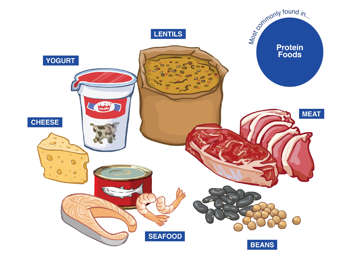What is zinc and what does it do?
Zinc is a nutrient that is found in a variety of foods. Zinc helps to strengthen the immune system and heal wounds. It supports normal growth and development during pregnancy, infancy, childhood and adolescence.
Sources of zinc and how to get enough
Zinc is naturally found in many foods. Some foods that are rich in zinc are red meat, poultry, seafood, yogurt, cheese, beans, nuts, legumes and whole grains. Some fortified breakfast cereals are also good sources of zinc.
Zinc sourced from plant-based foods is not as readily absorbed by the body. Therefore, vegetarians might need to eat as much as 50% more zinc than the recommended amounts.
You and your family can get enough zinc by eating a variety of foods rich in zinc throughout the week.

How much do we need?
Zinc recommendations*
| Age | Amount per day (milligrams/day) |
|---|---|
| Birth – 6 months | 2 mg |
| 7 – 12 months | 3 mg |
| 1 – 3 years | 3 mg |
| 4 – 8 years | 5 mg |
| 9 – 13 years | 8 mg |
| 14+ years (males) | 11 mg |
| 14 – 18 years (females) During pregnancy During breastfeeding | 9 mg 12 mg 13 mg |
| 19+ years (females) During pregnancy During breastfeeding | 8 mg 11 mg 12 mg |
*These recommendations are presented here simply as a guide to help you make informed food choices.
How much zinc can I find in a serving of food?
| Examples of food sources | Amount of zinc (mg) |
|---|---|
| 3 oz beef | 6 mg |
| 1 cup yogurt | 1 mg |
| ¾ cup lentils | 2 mg |
| 1.5 oz cheese | 1.5 mg |
| 1 oz pumpkin/squash seeds | 2.2 mg |
Special considerations
- A healthy individual following Canada's Food Guide typically does not need a zinc supplement.
- Ask your doctor about a zinc supplement if you have Crohn's disease, celiac disease or other digestive problems that recently required surgery, as these conditions may cause decreased absorption of zinc.
- If pregnant, ensure your diet has a variety of zinc rich foods, and take a prenatal multivitamin that contains zinc.
- Infants who are starting solid food should be offered foods rich in zinc.
